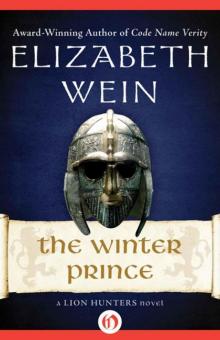- Home
- Elizabeth E. Wein
A Coalition of Lions Page 2
A Coalition of Lions Read online
Page 2
Telemakos spoke with deep and unfeigned devotion.
“I was little, but I won’t ever forget, my lord. Your uncle the emperor called you anbessa, his lion. Your warriors stood so silent, holding their spears upside down, their clothes all bloody. And you were naked to the waist to show how sorry you were. The emperor took your sword back, and hit your shoulders and face with its flat side because you had lost the battle, but he called you lionheart.”
Priamos went very still. I had seen him unhappy before: quiet and frowning when my father’s estate was under attack, and choked with stoppered emotion when he had to tell me of Lleu’s death; and quiet again, but acting with determined purpose to get me aboard a different ship, when he had suspected I was being tracked by a spy of Cynric’s or my aunt’s. Priamos was always quiet when he was disturbed. But I had never seen him this still. His brow was so heavy that he always seemed to scowl, even when he was calm, and it could have meant nothing; except he was so still.
I had known of his army’s defeat, but he had kept his personal failure closely guarded. I looked away, at the fountain, at the chattering monkeys, so I should not seem to notice the shameful scars on his soul stripped bare like this.
Priamos said at last, “My uncle only called me by my name.”
“Lionheart,” Telemakos insisted. “Priamos Anbessa, he called you.”
“We are all called Anbessa, I and my brothers and sisters. My father’s name was Anbessa, and we are called Anbessa after him, as you are called Meder.”
“Lion—”
Kidane cleared his throat ominously. Telemakos swallowed, and contained himself. He managed to say, “Welcome, most noble prince, welcome to your homeland.”
“Get off your knees,” Priamos said gently.
Telemakos moved to sit at my feet, and winningly clasped one of my hands between his own small, brown ones. “Stay with us, Princess Goewin,” he said. He said to me: “‘Greetings, stranger! Here in our house you’ll find a royal welcome. Have supper first, then tell us what you need.’” I stared down at his bowed head. He was reciting from Homer’s Odyssey.
His grandfather did not recognize it. “That is the most polite string of words you have ever uttered,” Kidane remarked.
Priamos burst into his rare, sweet and merry laughter, like a child. “What a gifted grandson you have!” he exclaimed. “The young charmer! He’s quoting his namesake, Odysseus’s son Telemakos. Greeting you with winged words, Princess! Those are Telemakos’s first words to the goddess Athena.”
“I know.” I spoke softly.
“I meant it, though,” Telemakos said, unabashed. “Will you stay in my grandfather’s house in Aksum, Princess Goewin, and become my mother’s friend, as your brother did?”
Kidane had already made me this offer, but coming from Telemakos it suddenly made my throat close up and my eyes swim. I had come four thousand miles, in fear of my life, hoping to find sanctuary among strangers; and instead here I was offered a home by my brother’s son, as he sat at my feet clasping my hand in his, greeting me as a goddess.
“Thank you,” I answered. “Yes, I would delight to stay in your house.”
“That is all right, isn’t it, Grandfather?”
“For the moment,” Kidane told him. “The princess may decide to stay in the palace, after she meets the viceroy. She is to be married to Constantine.”
“Today?”
Kidane laughed. “Not today. Next year, when they return to Britain. The monsoon is beginning; they cannot travel until winter is over, and even then they may postpone their journey until the Red Sea winds blow in their favor. Now go away, if you are going to ask impertinent questions.”
“I will be polite. Let me get my animals, and I will come and wait with you.” Telemakos scrambled to his feet again.
“My Noah’s Flood animals,” he explained over his shoulder, in case any of us thought he might mean the colobus monkeys he had been illegally feeding.
Kidane settled by me, lowering himself onto the wide stone lip of the fountain as though his grandson’s high spirits weighed too heavily on his shoulders for his body to endure. He laid the date branch at his side and smoothed flat the embroidered edges of his white robe. I asked quickly, under my breath, “Did Medraut know about Telemakos?”
“He did not. He left us many months before the child was born.”
Telemakos returned with a canvas satchel slung over his shoulder. He knelt before me again and began to take a series of lovely wooden figurines from his bag; these he ranged across the floor at my feet.
Priamos said, “Look at those animals!”
Telemakos glanced up and gave a respectful nod. “Pass them up here,” Priamos directed. “The princess has never seen creatures like these. You will have to teach her their names, so we can take her hunting when the rains end.”
“I don’t know the Latin,” Telemakos said.
“Latin’s no use to anyone,” said Priamos. He had been trained as an interpreter. He was not boastful, but he was given to flaunting his gift for languages. He had spent the long hours aboard ship telling me stories in his native Ethiopic and in Greek, the common language of the Red Sea, that I might learn a little of his speech before arriving in his homeland. “Use Greek or Ethiopic.”
Telemakos pressed the wooden animals into my hands: rhinoceros, leopard, ostrich, ibex.
“Do you like hunting, Princess Goewin?” Telemakos asked. “My mother rides in the hunt, but she does not shoot.”
“I like hunting,” I said.
“Do you shoot?”
“Yes.”
“I am a terrible shot. I’m a good tracker, though.”
Kidane laughed at him again. “You’d be lucky, boy. The gazelle of the Great Valley are a deal faster than those fat and lazy things the emperor keeps as pets. We’ll take you along some day and see how close you get.”
Telemakos lowered his gaze without argument, and I could see that he did as much stalking outside the palace walls as he did within them, only no one was supposed to know that. I thought to myself: His grandfather has no idea what this child’s limits are.
Baboon, buffalo, elephant, oryx. Telemakos continued to hand me his procession of wooden animals. Priamos, relenting, did try to remember the Latin names for them, but even he did not know them all: zebra, giraffe.
“These are my favorite,” Telemakos said: a lion and lioness.
“Leo,” I said. “Llew, in my mother’s native dialect.”
Telemakos placed the lion on my open palm.
“That’s why Father called my brother Lleu the young lion, sometimes,” I said softly, “though his name really means the Bright One. Llew: leo: anbessa.”
I held the wooden lion before me in my cupped hand. Its painted mane was black; its carved jaw was caught midsnarl, showing white teeth.
“Caleb had to wrestle a lion to prove he was strong enough to be emperor,” Telemakos said.
“He had to catch it,” Kidane corrected.
“His lions were tame. They ate from his hands.”
“They were not tame,” Priamos said quietly. “They were chained.”
Telemakos took back his lion and put it on the floor in file beside its mate at the head of his pageant. He bent his head over the animals.
“They were tame,” he insisted.
His clear voice softened with something like adoration. “Caleb let me touch them, before you took them to Britain. He let me stroke their manes, after I was presented to him last new year. Are they still in Britain?”
“They were destroyed when my father’s estate was burned,” I said. “I’m sorry, my love. There was a battle, and my parents and brothers were killed. That is why I came here.”
“Oh.” Telemakos tapped his wooden lions with the palm of his hand, then closed the hand into a fist and laid it in his lap. He asked slowly, “Are all the high king’s children killed, then?”
“All but I,” I answered.
Telemakos held still
, bent over his lions. If it dawned on him that I had just told him his father was dead, he did not draw attention to it. “You were lucky to get away,” he said at last.
“I must go back,” I told him.
CHAPTER II
Ella Amida
“PRINCESS GOEWIN. THE VICEROY sends to tell you he is at your service.”
The courtier who knelt before me was no older than I. He was dressed like Kidane, with a shamma overmantle and head cloth of closely woven linen, except that this young man’s head cloth was banded with ribbons of silver mesh.
“This is Ityopis Anbessa,” said Kidane, “another of the brothers lionheart.”
“Please don’t kneel,” I repeated. His formality infected everyone. Kidane and Priamos were on their feet, and Telemakos knelt on both knees with his face in his hands. What a trial it must be, I thought, to be six and not quite royal, and to have to throw yourself on the floor whenever any adult walks into the room. Father had never demanded such ceremony of me or Lleu.
Ityopis stood up. The brothers lionheart faced each other.
“Hornbill!” Ityopis cried in delight, and they caught each other’s shoulders and touched cheek to cheek. “I did not know you had been sent for!”
Priamos did not meet his brother’s eyes. “I have not been sent for,” he answered. “I came here as guide and translator for the princess, but no one sent for me.”
“And you trusted him, Princess?” Ityopis was laughing. “‘Have no trust in translators,’ that is what our uncle the emperor Caleb would have told you. Though he had Abreha in mind when he said it, I think, not Priamos Hornbill.”
“Abreha?” I asked.
“The self-styled king of Himyar,” Kidane said. “The victorious pretender.”
“He who won the battle against Ras Priamos,” Telemakos supplied, the gap in his teeth making him whistle over Priamos’s name.
“Abreha’s title is not self-styled,” Priamos said with his habitual scowl, though his voice was mild enough. “He was elected.”
“Let’s not talk of Himyar,” Ityopis said quickly. “My fault for speaking Abreha’s name. Our mother the queen of queens will have to call me Hornbill instead of you, Priamos. Has he explained why the queen of queens names him Hornbill, Princess—”
“Because I look like one,” Priamos interrupted, his heavy brow lowered ferociously.
“Because his tongue will never be reined when he is nervous or excited, and lets slip a deal of nonsense that were better left unsaid.”
I raised my own eyebrows. “Truly?”
“Has he not yet gone off his head with temper in your presence? Perhaps you have enspelled him, Princess—”
“Ityopis, keep hold of your own tongue or I will find someone to cut it out,” Priamos interrupted hotly, and said to me, “Pay no heed to this lapdog of his mother. He has always been abominably disrespectful of all his elder brothers. Sits on the emperor’s council and gets called dove, the peacemaker, by the emperor Caleb’s elder sister, our mother Candake the queen of queens! What monstrous rot!”
Through all this exchange they had not let go of each other’s shoulders.
“Tell me of my brothers, Peacemaker,” Priamos said. “Have you word of Mikael?”
“He sits as ever on his cliff top at Debra Damo, reciting the tale of Daniel a hundred times a day.”
“And Yared?”
“Sings. They say he is devising a way to write down his music. Perhaps Yared will be released from his sequestering when he is a little older, as you and I were,” Ityopis said. “And as Hector was.”
“And Abreha,” said Telemakos.
His grandfather struck him. Not hard enough to call it cruel, but hard enough to hurt. Telemakos knelt again. His poor knees. He hid his face in his hands and said humbly, “I don’t know what I did that time, Grandfather. I beg your pardon.”
Kidane sighed.
“Ityopis has said we will not speak of Himyar anymore,” Kidane said. “Don’t just hear what people say: listen. If you listen to everything, and keep your mouth shut until someone asks you a question, you won’t offend anyone. You’ll hear more that way, as well, because you won’t be sent off in disgrace. And, God willing, you’ll learn to tell what’s spoken appropriately, and what isn’t.
“Listen,” Kidane repeated.
“Yes,” Telemakos said quietly. “Yes, sir.”
And I, who had been listening carefully the whole time, realized that the pretender Abreha was also Priamos’s brother.
Constantine sat in a room of black and green marble. He was surrounded by attendant courtiers, and had the ceremonial spear bearers of the Aksumite emperor, the negusa nagast, king of kings, at his back. One of the company, a boy of fourteen or fifteen years who wore a plain white cotton shamma and head cloth, watched me steadily and frankly, which was the first time anyone in Aksum had eyed me other than with oblique glances. And in truth I must have been a troubling sight: unadorned with gold or precious jewels, my hair plaited and pinned up simply in the way I had learned to care for it myself during my journey, my skirt patched and faded.
Constantine rose and came forward to greet me. He was not much taller than me, and close to my age, like Priamos. His sandy hair was banded with an Aksumite head cloth; he wore a small pointed beard, also like Priamos. He took me by the hands and said, “Welcome, cousin, to the imperial city of the Aksumite peoples.”
He spoke Latin, which meant that most there could not understand what he was saying. “My dear Goewin, you are still so very young!” he said. “How did you dare the journey from Britain? What can have brought you here? Could you not wait until next year for a husband?”
I could not return his smile. I answered stiffly in my limping Ethiopic, so that my words should not need to be translated or told twice. “I did not come seeking a husband. I came seeking the protection of the emperor Caleb, Ella Asbeha, who brought forth the dawn, my father’s most powerful and influential ally.”
“The emperor could not have made that offer himself,” said Constantine. It was a bald statement of truth, lacking of sympathy or interest, and my dislike of him grew.
“He did not,” I said patiently. “I had the invitation from Ras Priamos, the emperor Caleb’s nephew and envoy. Priamos did not expect, and neither did I, to find his emperor’s kingdom made handsel to a foreign princeling.”
That insulted him, as it was meant to. Constantine stood pressing his lips together. Then for the first time he glanced at Priamos, who for months had been my most true and brave companion. “Priamos Anbessa,” said Constantine softly, in Ethiopic also. “What are you doing in this city?”
The question took Priamos by surprise.
“Make a reply,” said Constantine.
Priamos answered reasonably, his voice low, “I could not let the princess journey alone.”
“You were sent to Britain for an appointment that should last no less than three years. You have acted in direct defiance of your king in coming here. Was there no gratitude in you for being entrusted with such a position, after your disgrace in Himyar?”
I could not believe Constantine was talking over my head, questioning my guide’s loyalty, without knowing why I was here. I was used to standing aside and keeping my mouth shut. But I was the high king’s daughter, and I was not used to being ignored.
“Constantine, hear me out,” I said. “The kingship of Britain—”
My mistake was in stubbornly trying to make myself understood in Ethiopic. I had to work hard to follow it in conversation, and I could not speak it as well as I could understand it. In Latin I could have explained myself quickly. But Constantine cut off my stumbling story, all his attention now focused on Priamos.
“The prince Wazeb is Caleb’s chosen heir, and my ward. I will not allow him to be threatened by the grasping of minor royalty,” Constantine said. “If you so boldly defy the mandate of your uncle the emperor as his emissary in Britain, abandoning a post that many here think you did not d
eserve after you failed to defeat Abreha’s army, what else can you be plotting?”
“I did not think I could be breaking my mandate in protecting the princess of Britain. But I see that I have,” Priamos answered unhappily. “I never meant to do other than serve my uncle as he bid me. I was trained to it.”
“Well, and so was the pretender Abreha, and that has not stood in the way of his treachery in Himyar!”
“I am not Abreha,” said Priamos quietly.
“Yet after him you are the eldest son of Candake the queen of queens, the eldest of Caleb’s nephews, and I find you here in violation of your commission.”
“How am I Candake’s eldest? What of Mikael?”
“Mikael!” Constantine laughed. “Mikael is insane.”
“So should you be if you had spent the last thirty years shut up in the same three rooms!” Priamos burst out, in the most uncontrolled blaze of passion that I had ever seen from him.
There was a still, terrible moment while Constantine and Priamos faced each other, pale and dark, like a matched pair of opposing chessmen.
Then Constantine said in a flat voice, “You are under arrest for desertion. You will submit yourself to detainment in this house, or I will have you tried for apostasy against the empire’s heir.”
All this while I was struggling to understand the language. “Apostasy?” I asked desperately.
“Treason,” whispered Priamos in Latin, stunned.
“I am regent here,” Constantine went on. “I act for the king of kings Ella Asbeha, the emperor Caleb, as his viceroy Ella Amida. You stand and challenge me in open defiance of my authority.”
Constantine spoke, as he must have known, to the strict protocol of all Priamos’s sequestered childhood and military training. Priamos, without seeming to show any kind of irony or insolence, knelt at Constantine’s feet in the deep obeisance that he had made to my father when first they met, his hands open as if in supplication.
The boy in the white cotton cloak said suddenly, “You would be prone before your uncle the emperor.”
“I submit to your authority,” said Priamos, and lay flat on his chest, with his face sunken against his forearms.

 The Pearl Thief
The Pearl Thief Cobalt Squadron
Cobalt Squadron The Empty Kingdom
The Empty Kingdom Code Name Verity
Code Name Verity Rose Under Fire
Rose Under Fire A Coalition of Lions
A Coalition of Lions Black Dove, White Raven
Black Dove, White Raven The Winter Prince
The Winter Prince The Sunbird
The Sunbird